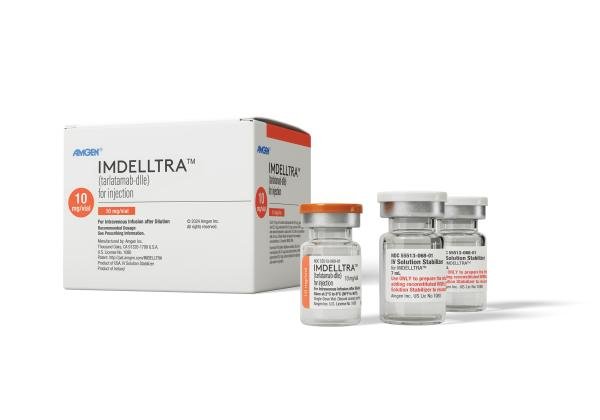Imdelltra Side Effects
Generic name: tarlatamab
Medically reviewed by Drugs.com. Last updated on Jul 10, 2024.
Note: This document provides detailed information about Imdelltra Side Effects associated with tarlatamab. Some dosage forms listed on this page may not apply specifically to the brand name Imdelltra.
Applies to tarlatamab: intravenous powder for injection.
Important warnings
This medicine can cause some serious health issues
Tell your medical caregivers if you have symptoms of a serious side effect, such as fever, chills, trouble breathing, vomiting, or severe tiredness.
Tarlatamab can also cause life-threatening nerve problems. Tell your caregivers or seek emergency medical attention if you have problems with speech, problems with thinking or memory, confusion, or a seizure.
Tarlatamab can increase your risk of serious bleeding. Stop using this medicine and call your doctor at once if you have severe stomach pain, bloody or tarry stools, coughing up blood, or any heavy or unusual bleeding.
Get emergency medical help if you have signs of an allergic reaction: hives, difficult breathing, swelling of your face, lips, tongue, or throat.
Call your doctor at once if you have:
-
low blood cell counts--fever, chills, tiredness, mouth sores, skin sores, easy bruising, unusual bleeding, pale skin, cold hands and feet, feeling light-headed or short of breath;
-
signs of infection--fever, chills, sore throat, body aches, unusual tiredness, loss of appetite, bruising or bleeding; or
-
symptoms of liver failure--diarrhea, loss of appetite, pain or swelling in your stomach, swelling in your legs, easy bleeding, drowsiness, confusion, or jaundice (yellowing of the skin or eyes).
Your cancer treatments may be delayed or permanently discontinued if you have certain side effects.
Common side effects may include:
-
abnormal lab results;
-
metallic taste in your mouth;
-
muscle or bone pain;
-
tiredness;
-
fever; or
-
loss of appetite.
This is not a complete list of side effects and others may occur. Call your doctor for medical advice about side effects.
See also:
For healthcare professionals
Applies to tarlatamab: intravenous powder for injection.
General adverse events
The most common adverse events were cytokine release syndrome, fatigue, pyrexia, dysgeusia, decreased appetite and musculoskeletal pain.[Ref]
Immunologic
- Very common (10% or more): Cytokine release syndrome (55%)[Ref]
Musculoskeletal
- Very common (10% or more): Musculoskeletal pain (30%)[Ref]
Metabolic
- Very common (10% or more): Hyponatremia (68%), decreased potassium (50%), decreased magnesium (33%), increased sodium (26%)[Ref]
Genitourinary
- Very common (10% or more): Urinary tract infection (10%)[Ref]
Hepatic
- Very common (10% or more): Increased hepatic enzymes: AST (44%), ALT (42%)
Respiratory
Other
Hematologic
- Very common (10% or more): Anemia (27%), decreased lymphocytes all grades (84%), decreased hemoglobin (58%), decreased white blood cells (44%), decreased platelets (33%), decreased neutrophils (12%)[Ref]
Nervous system
- Very common (10% or more): Dysgeusia (36%)[Ref]
Renal
- Very common (10% or more): Increased creatinine (29%)
Gastrointestinal
- Very common (10% or more): Nausea (22%), constipation (30%)[Ref]
References
1. (2024) "Product Information. Imdelltra (tarlatamab)." Amgen USA
More about Imdelltra (tarlatamab)
- Check interactions
- Compare alternatives
- Pricing & coupons
- Drug images
- Dosage information
- During pregnancy
- FDA approval history
- Drug class: bispecific T-cell engagers (BiTE)
- Breastfeeding
- En español
Patient resources
Professional resources
Related treatment guides
Further information
Imdelltra side effects can vary depending on the individual. Always consult your healthcare provider to ensure the information displayed on this page applies to your personal circumstances.
Note: Medication side effects may be underreported. If you are experiencing side effects that are not listed, submit a report to the FDA by following this guide.

